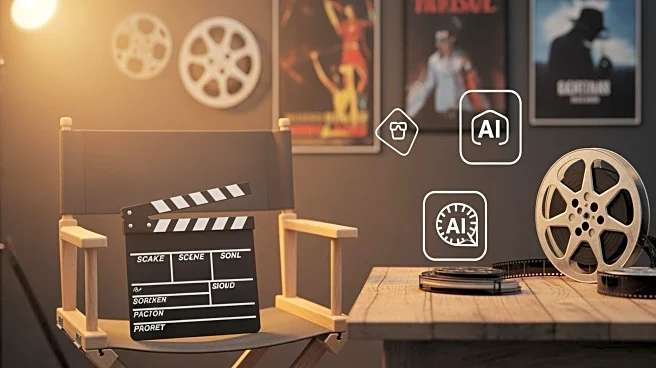What's Happening?
Guillermo del Toro, renowned filmmaker, has publicly declared his strong opposition to the use of generative artificial intelligence in his films. In a recent interview, del Toro expressed his preference to avoid AI technology entirely, likening its unchecked
development to the arrogance of Victor Frankenstein, the protagonist of Mary Shelley's novel. Del Toro's upcoming film, 'Frankenstein,' which is set to release on Netflix, explores themes of creation and consequence, drawing parallels between the fictional character and modern tech developers. Del Toro emphasized that the real danger lies not in AI itself but in 'natural stupidity,' which he believes could lead to the misuse of such technology.
Why It's Important?
Del Toro's stance highlights a growing debate within the film industry regarding the ethical implications of AI technology. As AI becomes increasingly integrated into various aspects of filmmaking, concerns about creativity, originality, and the potential for job displacement are rising. Del Toro's rejection of AI underscores a broader resistance among artists who fear that reliance on technology could undermine the human element of storytelling. This perspective is significant as it may influence industry standards and practices, encouraging filmmakers to prioritize traditional methods over digital innovation.
What's Next?
With del Toro's 'Frankenstein' set to debut on Netflix, the film may serve as a catalyst for further discussions on the role of AI in creative industries. As audiences engage with the film's themes, there could be increased scrutiny on how technology is utilized in storytelling. Industry leaders and filmmakers may be prompted to reevaluate their approaches to AI, potentially leading to new guidelines or ethical standards. Del Toro's outspoken views may inspire other creators to voice their concerns, shaping future discourse on the balance between technology and artistry.
Beyond the Headlines
Del Toro's comments reflect a deeper cultural apprehension about the rapid advancement of technology and its impact on society. The comparison to Victor Frankenstein suggests a cautionary tale about the consequences of unchecked innovation. This narrative may resonate with audiences who are increasingly aware of the ethical dilemmas posed by AI. As technology continues to evolve, the film industry may face challenges in maintaining artistic integrity while embracing new tools. Del Toro's perspective could contribute to a broader conversation about the responsibilities of creators in the digital age.
















